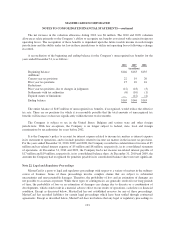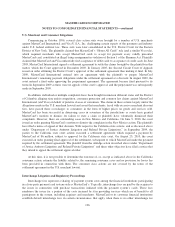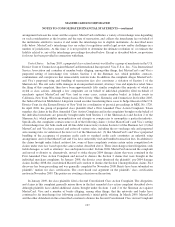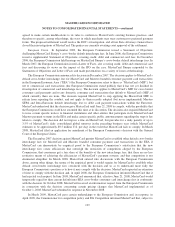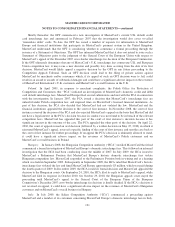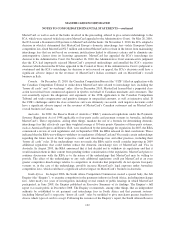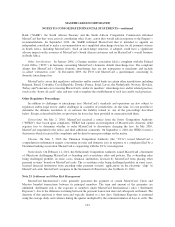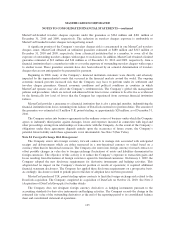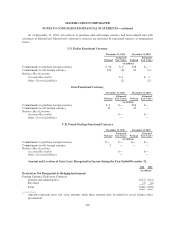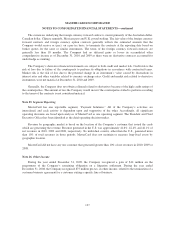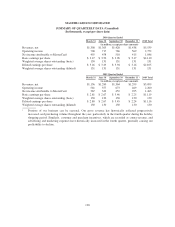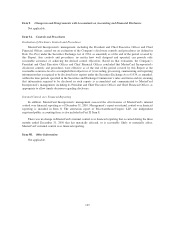MasterCard 2010 Annual Report Download - page 142
Download and view the complete annual report
Please find page 142 of the 2010 MasterCard annual report below. You can navigate through the pages in the report by either clicking on the pages listed below, or by using the keyword search tool below to find specific information within the annual report.MASTERCARD INCORPORATED
NOTES TO CONSOLIDATED FINANCIAL STATEMENTS—continued
MasterCard, as well as each of the banks involved in the proceeding, offered to give certain undertakings to the
ICA, which were rejected (which rejection MasterCard appealed to the Administrative Court). On May 28, 2010,
the ICA issued a Statement of Objections to MasterCard and the banks. On November 3, 2010, the ICA adopted a
decision in which it determined that MasterCard Europe’s domestic interchange fees violate European Union
competition law, fined MasterCard €2.7 million and ordered MasterCard to refrain in the future from maintaining
interchange fees that are not based on economic justifications linked to efficiency criteria and to eliminate any
anticompetitive clauses from its licensing agreements. MasterCard has appealed the ICA’s interchange fee
decision to the Administrative Court. On November 16, 2010, the Administrative Court announced its judgment
that the ICA had improperly rejected MasterCard’s proposed undertakings and annulled the ICA’s rejection
decision (which decision the ICA has appealed to the Council of State). If the Administrative Court’s judgment is
overturned and the ICA’s interchange fee decision is not reversed on appeal, the ICA’s decision could have a
significant adverse impact on the revenues of MasterCard’s Italian customers and on MasterCard’s overall
business in Italy.
Canada. On December 15, 2010, the Canadian Competition Bureau (the “CCB”) filed an application with
the Canadian Competition Tribunal to strike down MasterCard rules related to interchange fees, including the
“honor all cards” and “no surcharge” rules. Also in December 2010, MasterCard learned that a purported class
action lawsuit had been commenced against it in Quebec on behalf of Canadian merchants and consumers. The
suit essentially repeats the allegations and arguments of the CCB application to the Canadian Competition
Tribunal and seeks compensatory and punitive damages in unspecified amounts, as well as injunctive relief. If
the CCB’s challenges and/or the class action law suit were ultimately successful, such negative decisions could
have a significant adverse impact on the revenues of MasterCard’s Canadian customers and on MasterCard’s
overall business in Canada.
Australia. In 2002, the Reserve Bank of Australia (“RBA”) announced regulations under the Payments
Systems (Regulation) Act of 1998 applicable to four-party credit card payment systems in Australia, including
MasterCard’s. Those regulations, among other things, mandate the use of a formula for determining domestic
interchange fees that effectively caps their weighted average at 50 basis points. Operators of three-party systems,
such as American Express and Diners Club, were unaffected by the interchange fee regulation. In 2007, the RBA
commenced a review of such regulations and, in September 2008, the RBA released its final conclusions. These
indicated that the RBA was willing to withdraw its regulations if MasterCard and Visa made certain undertakings
regarding the future levels of their respective credit card interchange fees and other practices, including their
“honor all cards” rules. If the undertakings were not made, the RBA said it would consider imposing in 2009
additional regulations that could further reduce the domestic interchange fees of MasterCard and Visa in
Australia. In August 2009, the RBA announced that it had decided not to withdraw its regulations and that it
would maintain them in their current form pending further consideration of the regulations. MasterCard plans to
continue discussions with the RBA as to the nature of the undertakings that MasterCard may be willing to
provide. The effect of the undertakings or any such additional regulations could put MasterCard at an even
greater competitive disadvantage relative to competitors in Australia that purportedly do not operate four-party
systems or, in the case of the undertakings, possibly increase MasterCard’s legal exposure under Australian
competition laws, which could have a significant adverse impact on MasterCard’s business in Australia.
South Africa. In August 2006, the South Africa Competition Commission created a special body, the Jali
Enquiry (the “Enquiry”), to examine competition in the payments industry in South Africa, including interchange
fees. After nearly two years of investigation, including several rounds of public hearings in which MasterCard
participated, in June 2008, the Enquiry published an Executive Summary of its findings. The Enquiry’s full
report was made public in December 2008. The Enquiry recommends, among other things, that an independent
authority be established to set payment card interchange fees in South Africa and that payment systems’
(including MasterCard’s) respective “honor all cards” rules be modified to give merchants greater freedom to
choose which types of cards to accept. Following the issuance of the Enquiry’s report, the South African Reserve
132



